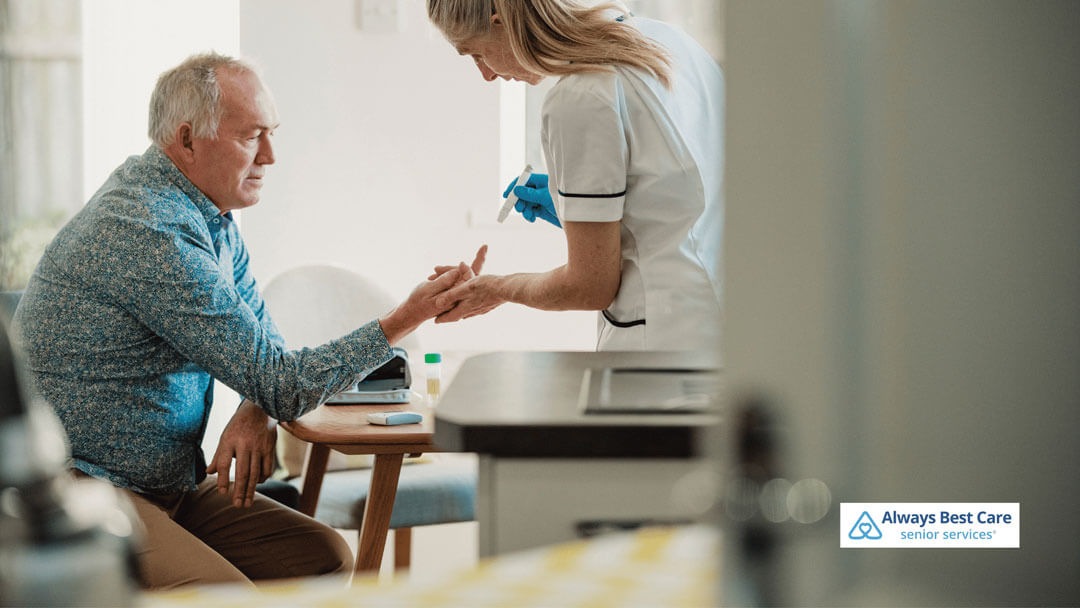Diabetes Awareness: Helping Seniors Stay Healthy and Informed

Health becomes a top priority as we age, especially when managing conditions like diabetes. It’s not just about keeping blood sugar in check—diabetes can impact various areas of health, from eyesight to wound healing.
For seniors, staying informed and proactive can make all the difference!
Table of Contents
What is Diabetes, and How Does It Affect Seniors?
Diabetes is a condition that affects how the body processes glucose or blood sugar.
For seniors, managing diabetes is especially important since the condition can lead to complications like heart disease, nerve damage, and other long-term health concerns.
By understanding the signs and adopting healthy habits, seniors can better control their diabetes and improve their quality of life!
Recognizing the Early Signs of Diabetes
For those unfamiliar with diabetes, the early signs can sometimes be easy to miss. However, being aware of these symptoms can make all the difference in catching the condition early and managing it effectively. Here are some critical signs that seniors and their caregivers should watch out for:
- Frequent Thirst and Increased Urination: One of the most common signs of diabetes is excessive thirst, known as polydipsia. This often goes hand in hand with increased urination (polyuria), as the body tries to rid itself of excess glucose by flushing it out through urine.
- Unexplained Weight Loss: Diabetes can cause unexpected weight loss, even if you haven’t changed your eating habits. This occurs because the body cannot properly use glucose for energy, so it breaks down fat and muscle tissue.
- Blurry Vision: High blood sugar levels can lead to changes in the fluid levels in your eyes, causing blurred vision. This symptom can be particularly concerning for seniors as it may be mistaken for age-related vision changes.
- Tiredness and Fatigue: Feeling fatigued is another common early sign of diabetes. When your body is not processing glucose properly, you may feel drained of energy, even after a full night’s sleep.
- Slow-Healing Wounds or Frequent Infections: Diabetes can impair the body’s ability to heal, leading to slow-healing wounds, especially in the feet. Seniors should be particularly mindful of any cuts, blisters, or sores that take longer than usual to heal, as this could be an early indication of diabetes.
Protecting Eye Health and Preventing Vision Loss
Diabetic retinopathy, which damages the blood vessels in the retina, can lead to vision loss if left untreated.
Seniors should schedule regular eye exams to catch any early signs of damage.
Watching for warning signs like blurry vision or difficulty seeing at night is also a good idea. Eye health is closely linked to overall well-being, and catching vision problems early can prevent further complications.
Wound Healing and the Importance of Foot Care
Diabetes can slow wound healing, especially in the feet. For seniors, this can lead to infections or other serious problems.
Regular foot check-ups are essential to keep track of any cuts, blisters, or sores that may not heal properly. A simple daily foot inspection and keeping feet clean and moisturized can go a long way in preventing wounds from becoming worse.
Healthy Habits to Manage Diabetes
Managing diabetes doesn’t have to be overwhelming. By adopting a few simple lifestyle changes, seniors can improve their health and keep diabetes under control. Here are some key habits to focus on:
- Eat a Balanced Diet: A healthy diet plays a huge role in managing diabetes. Focusing on whole grains, lean proteins, healthy fats, and plenty of fruits and vegetables can help stabilize blood sugar levels. It’s important to avoid processed foods, sugary snacks, and drinks that can cause blood sugar spikes. Portion control and eating at regular intervals also help maintain balance.
- Stay Physically Active: Regular physical activity helps the body use insulin more efficiently, which is crucial for blood sugar control. Seniors don’t need intense workouts—a simple daily walk, light yoga, or gentle exercises can make a big difference. Staying active also helps with weight management and improves overall energy levels.
- Monitor Blood Sugar Levels: Regularly checking blood sugar levels is essential for managing diabetes. This allows seniors to track how their body responds to food, medication, and activity. Many people with diabetes use a glucose monitor to check their levels at home, helping them adjust their routine as needed and avoid any potential complications.
- Attend Regular Doctor’s Appointments: Consistent medical care is crucial for diabetes management. Seniors should make it a priority to attend regular check-ups with their healthcare provider. These appointments allow doctors to monitor their condition, adjust medication, and check for any diabetes-related complications such as heart disease or nerve damage.
- Stay Hydrated: Drinking plenty of water helps regulate blood sugar levels and keeps the body functioning properly. Dehydration can cause blood sugar levels to rise, so it’s important to ensure you drink enough water throughout the day, especially during hot weather.
- Prioritize Foot Care: Since diabetes can lead to poor circulation and slow-healing wounds, foot care is essential. Seniors should regularly moisturize and regularly inspect their feet for cuts, blisters, or sores. Wearing comfortable shoes and visiting a doctor for regular foot exams are important steps to prevent complications.
Staying Informed and Connected
There’s no shortage of resources available for seniors with diabetes, from local support groups to educational websites. Connecting with health professionals and other seniors managing diabetes can provide the information and motivation to stay on top of health. It’s all about maintaining a healthy balance and staying informed about the steps needed to prevent complications.
Taking Charge of Health with Knowledge
Diabetes might require extra care and attention, but seniors can live healthy, fulfilling lives with the right approach. Seniors can confidently take charge of their health by focusing on key areas like eye health, wound healing, and building healthy habits. Staying informed is one of the best ways to stay ahead.
How Always Best Care of Denver Can Help
At Always Best Care of Denver, we are committed to helping seniors manage their diabetes with the right care and support. Here’s how we can assist:
- Personalized Care Plans: We create customized care plans that fit the unique needs of each senior. These plans include assistance with meal preparation to ensure a balanced diet that helps control blood sugar levels, as well as monitoring and medication reminders to help seniors stay on track.
- Encouraging Physical Activity: Staying active is crucial for managing diabetes, and we encourage seniors to participate in safe, gentle exercises. Our caregivers are trained to help seniors with activities like walking, light stretching, or chair exercises to promote better circulation and overall health.
- Regular Blood Sugar Monitoring: Monitoring blood sugar levels is vital in diabetes management. We help seniors by reminding them to check their levels regularly and assist with tracking results so any changes can be promptly addressed with their healthcare provider.
- Foot Care and Wound Prevention: We know diabetes can lead to foot issues, so we prioritize foot care. Our caregivers are trained to assist with daily foot inspections, ensuring any cuts or sores are noticed early and treated properly to prevent infections. We can also provide help with wound care for seniors who may already have slow-healing injuries.
- Eye Health and Vision Care: Diabetic retinopathy and vision loss are common concerns for seniors with diabetes. We support seniors by scheduling and accompanying them to regular eye exams, monitoring and protecting their eye health.
Working closely with seniors and their families, we help create a supportive environment that makes managing diabetes easier. We aim to give seniors the tools and care they need to stay healthy and continue living independently.
Take Control of Diabetes with Compassionate In-Home Care!
Ready to get the support you need to manage diabetes with confidence? At Always Best Care of Denver, we’re here to help you or your loved one stay healthy and independent. Contact us today to learn more about our personalized care plans and how we can make diabetes management easier. Let’s work together to ensure a brighter, healthier future.
Contact Always Best Care of Denver at (303) 952-3060 to learn more and schedule your free consultation.





